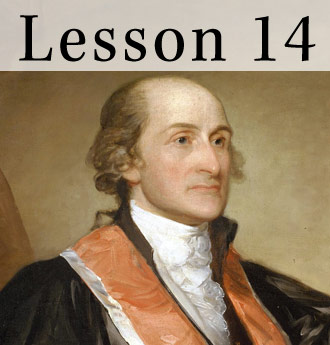Lesson 14: What Was the Federalist Position in the Debate about Ratification?
Hamilton, Alexander (1755-1804) Hamilton was a senior aide-de-camp to General Washington and an artillery captain during the Revolutionary War. He was a delegate from New York to the Philadelphia Convention and one of three authors of The Federalist, written to urge ratification of the U.S. Constitution. He later served as the first secretary of the treasury, put the nation's finances on a firm footing and advocated a strong national government.
Jay, John (1745-1829) Jay was the first chief justice of the United States, serving from 1789 to 1795. He wrote New York's first constitution. Jay served as president of the Continental Congress and as minister to Spain and England. He was a strong supporter of the Constitution and one of the authors of The Federalist. Jay was appointed chief justice by President Washington but resigned in 1795 when he was elected governor of New York.
Madison, James (1751-1836) The "Father of the Constitution" was born to a wealthy Virginia family. He was taught at home and in private schools, then graduated from the College of New Jersey. While deciding whether to become a lawyer or minister, Madison became involved in the revolutionary cause, thereby entering state and local politics. His poor health kept him from serving in the military. In 1780, Madison was chosen to serve in the Continental Congress, where he played a major role. He was one of the most influential voices calling for a constitutional convention. He came to the Philadelphia Convention with a plan for the new government, took extensive notes on the proceedings, spoke more than 150 times, and worked tirelessly on various committees. As one of the authors of The Federalist, Madison was also a key figure in the battle for ratification. Following the convention, Madison served as a member of the U.S. House of Representatives, helping to frame the Bill of Rights and organize the executive department. Under Jefferson, Madison served as secretary of state. He then succeeded Jefferson as president. In retirement, Madison continued to speak out on public issues.
Washington, George (1732-1799) George Washington was born in Virginia in 1732. He grew up there on several plantations along the Potomac and Rappahannock Rivers. He was not particularly well educated, but did learn surveying. In 1753, he began his service to the country, which was to continue throughout his life, despite his desire to live a more private existence. Washington's efforts as commander of the Continental Army are well known. After the Treaty of Paris was signed in 1783, Washington returned to his home, Mount Vernon. Although he did not initially want to attend the Philadelphia Convention, his friends convinced him that his presence was necessary. He was elected president of the convention but spoke little. His presence and approval, however, were important. Nearly everyone assumed that Washington would be the first president of the United States, which, of course, he was, serving from 1789-1797.






